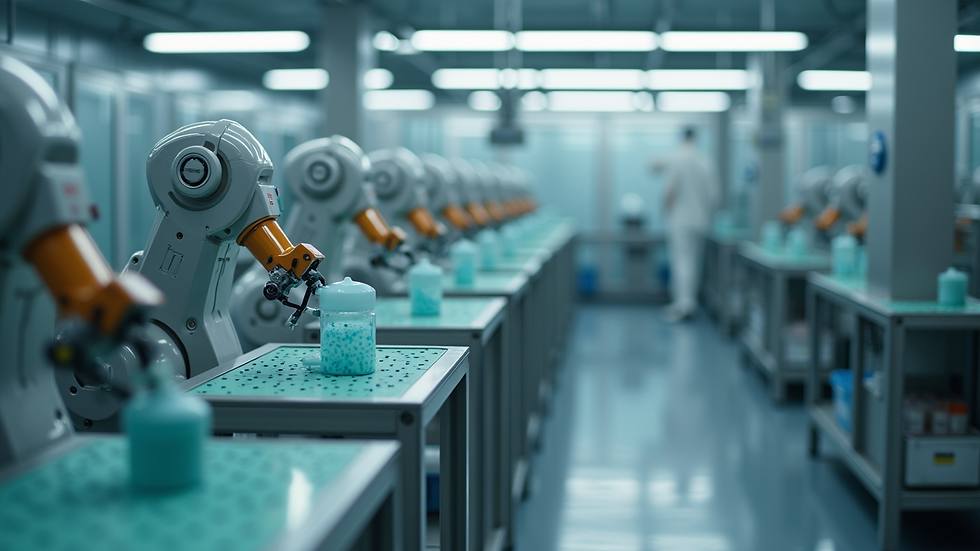Exploring Innovations in Pharmaceutical Manufacturing
- Farbe Firma Admin
- Jun 30
- 4 min read
Updated: Jul 6
In recent years, the pharmaceutical industry has been undergoing rapid changes, driven by advancements in technology and an increasing demand for personalized medicine. As we explore the innovations in pharmaceutical manufacturing, it's essential to understand how these developments are reshaping the landscape of drug production. From the introduction of automation and artificial intelligence to advancements in biotechnology, the future of drug production promises to be efficient, cost-effective, and more patient-centric than ever before.
Modern Drug Production
The traditional model of pharmaceutical manufacturing involved lengthy processes with numerous manual interventions, often leading to delays and higher production costs. However, with modern advancements, the industry is moving towards more streamlined processes that leverage technology.
For instance, continuous manufacturing has gained traction as a method that allows for the uninterrupted production of drugs. This approach not only enhances efficiency but also reduces production times significantly. According to the International Society for Pharmaceutical Engineering, continuous manufacturing can save companies up to 30% in operational costs.
Image Placeholder

Moreover, the use of sophisticated software in planning and scheduling has revolutionized how drug products are made. Intelligent systems can analyze market demand and adjust production strategies in real-time, ensuring companies can respond promptly to changes in consumer needs.
The Role of Automation in Pharmaceutical Manufacturing
Automation is a game-changer in the pharmaceutical sector. By implementing robotic systems and automated machinery, companies are able to minimize human errors and enhance the speed of drug production. For instance, robots are capable of executing repetitive tasks, such as pill sorting and packaging, rapidly and accurately.
These automated systems also enhance safety by limiting human interaction with hazardous substances. As per a report by the McKinsey Global Institute, automating pharmaceutical manufacturing processes could lead to a productivity increase of approximately 20%-30%.
Image Placeholder

Furthermore, the use of automation can help in complying with stringent regulatory standards. Digital systems can document every step of production, creating an electronic trail that helps in audits and regulatory compliance.
What Degree for Pharmaceutical Manufacturing?
For those interested in a career in pharmaceutical manufacturing, obtaining the right educational background is crucial. Typically, a degree in pharmaceutical sciences, chemistry, or chemical engineering is recommended.
Programs in these fields often include coursework in biochemistry, microbiology, and quality control, which are essential for understanding the complexities of drug production.
Internships and practical experience are highly encouraged, as they provide valuable hands-on learning opportunities. Many universities also collaborate with pharmaceutical companies, creating pathways for students to engage in research projects that address real-world challenges in drug development.
Image Placeholder

Furthermore, continuous education is important in this field. As technologies evolve, professionals may consider additional certifications or advanced degrees to remain competitive.
Advances in Biotechnology and Drug Development
Biotechnology is playing a pivotal role in transforming modern drug production. With the advent of biopharmaceuticals, companies are now capable of developing targeted therapies that can effectively treat diseases at a molecular level.
For example, monoclonal antibodies have revolutionized cancer treatment by specifically targeting cancer cells while sparing healthy tissue. As per the Biotechnology Innovation Organization, the current market for biopharmaceuticals is projected to exceed $300 billion by 2024.
Moreover, innovations such as CRISPR gene editing and personalized medicine are paving the way for customized treatment plans based on an individual's genetic makeup. This shift towards personalized medicine is expected to enhance patient outcomes and reduce the overall burden on healthcare systems.
The Impact of Data Analytics
In an era of big data, the pharmaceutical sector is harnessing data analytics to improve every aspect of drug production. Companies are now utilizing predictive analytics to forecast demand, optimize production schedules, and enhance supply chain efficiency.
By leveraging data, organizations can make informed decisions that not only streamline operations but also reduce waste and lower costs. According to a survey by Deloitte, 62% of pharmaceutical executives believe that data analytics will lead to significant improvements in productivity and innovative capability.
Furthermore, the integration of data analytics with artificial intelligence offers the potential to uncover patterns and insights that were previously overlooked, enabling continuous improvement in manufacturing processes.
The Future of Sustainable Pharmaceutical Manufacturing
Sustainability is becoming an integral focus in the pharmaceutical industry. With increasing pressure to minimize environmental impact, many manufacturers are adopting greener practices. This includes reducing waste, implementing energy-efficient technologies, and utilizing sustainable materials in drug production.
For example, companies are investing in bio-based processes that utilize renewable resources instead of traditional petrochemical feedstocks. Innovations such as biodegradable packaging and processes that minimize water usage are also emerging trends.
In addition, regulatory bodies are beginning to require companies to showcase their commitment to sustainability. Organizations like the FDA are introducing guidelines to encourage environmentally friendly practices, further motivating companies to adopt these innovations.
A Glimpse into the Horizon
Looking ahead, the future of pharmaceutical manufacturing appears promising. The integration of advanced technologies such as 3D printing for drug production, artificial intelligence for predictive modeling, and IoT (Internet of Things) for real-time monitoring are just a few innovations set to reshape the landscape.
As these technologies mature, the industry will likely see significant changes in how drugs are developed, manufactured, and delivered. The drive towards agility, efficiency, and patient-centric solutions will continue to fuel innovation, ultimately resulting in better health outcomes for patients around the globe.
By embracing these innovations, pharmaceutical companies can position themselves as leaders in a rapidly evolving market- one where technological capabilities will dictate success. It's an exciting time for all stakeholders in the industry, from students entering pharmaceutical sciences to companies on the cutting edge of drug production.




Very interesting article, Thank You for sharing.
Kind regards Kjeld Lund - Cleanroom Specialist